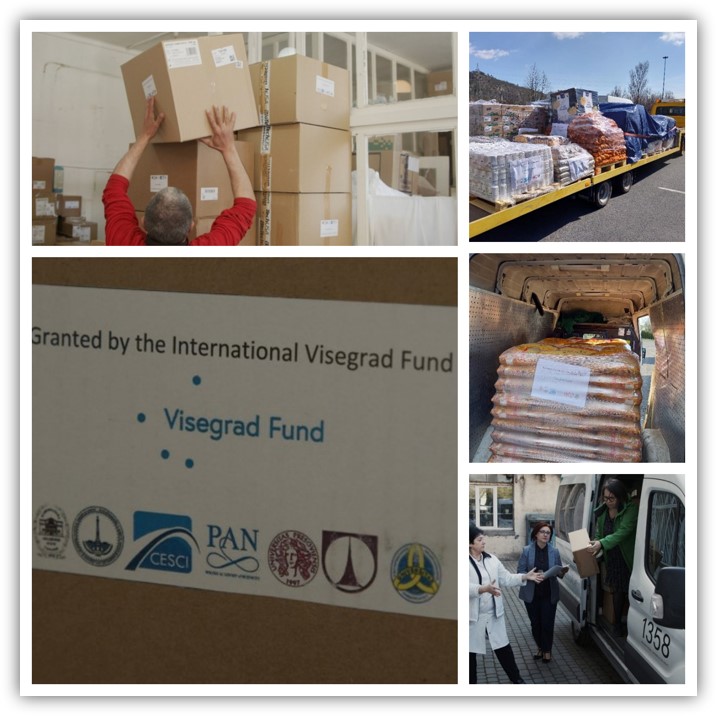For the Europeanisation of Ukrainian borders
With cross-border cooperation for the Europeanisation of Ukrainian borders
With cross-border cooperation for the Europeanisation of Ukrainian borders
In November 2020 the project called “With cross-border cooperation for the Europeanisation of Ukrainian borders” was launched with the support of the International Visegrad Fund. The project was led by CESCI in collaboration with the State University «Uzhgorod National University» (Faculty of Law), Institute of Economic and Legal Research of the National Academy of Sciences of Ukraine (IELR NASU), University of Presov, Faculty of Arts, Institute of Political Science, Stanisław Leszczycki Institute of Geography and Spatial Organization Polish Academy of Sciences and the Technical University of Liberec.
The main objective of the project was to contribute to the Europeanisation of the Ukrainian borders by boosting cross-border cooperation. For this end a comparative analysis was elaborated which examined the legal framework governing the cross-border cooperation of the Visegrad countries, and which provided a basis for the formulation of some drafting recommendations for the amendments of existing legislation of Ukraine. Furthermore, in order to improve the capacity of local actors, a training material was also developed, which was planned to be also used in practice during the first training on CBC organised within the project. However, due to the pandemic and the war, the training and the planned international conference could not be organised. Instead almost 7 tons of food and 80 boxes of medical equipment were shipped within the frameworks of the project to help those living in the region.

The project is co-financed by the Governments of Czechia, Hungary, Poland and Slovakia through Visegrad Grants from International Visegrad Fund. The mission of the fund is to advance ideas for sustainable regional cooperation in Central Europe. For more information please visit: www.visegradfund.org.

Kick-off seminar
With the support of the International Visegrad Fund, the six project partners representing National Academies of Sciences, Universities and CBC-drivers of the V4 countries and Ukraine got together to launch a project for the Europeanisation of Ukrainian borders. The online kick-off seminar – attended by more than 60 participants – offered a gap-filling platform for academics, CBC practitioners and young professionals to meet and share the most state of the art knowledge on driving cross-border cooperation.
The kick-off seminar’s aim was to place the project in the Europeanisation process of the Ukrainian cross-border cooperation. For this purpose, the speakers gave an overview on:
The detailed agenda can be accessed here, from where also the presentations can be downloaded.
Technical meeting
Towards the half-time of the project, the partners organized an online meeting to discuss the experience gained so far during the implementation of the project and to organize the following tasks.
On the basis of the forthcoming training material, the organization of the training planned for the autumn has started and the development of the recommendations for Ukraine will be carried out. All results will be reported here.
Training
The war in Ukraine made it impossible to organize the planned training.
International conference
The war in Ukraine made it impossible to organize the planned conference.
Humanitarian Aid
As the planned training and international conference could not be organized due to the COVID-19 pandemic and then the Russian-Ukrainian war, in agreement with the International Visegrad Fund and the project partners, almost 7 tons of food and 80 boxes of medical equipment were shipped within the frameworks of the project to help those living in the region.





This is a notification that can be used for cookie consent or other important news. It also got a modal window now! Click "learn more" to see it!
OKLearn MoreWe may request cookies to be set on your device. We use cookies to let us know when you visit our websites, how you interact with us, to enrich your user experience, and to customize your relationship with our website.
Click on the different category headings to find out more. You can also change some of your preferences. Note that blocking some types of cookies may impact your experience on our websites and the services we are able to offer.
These cookies are strictly necessary to provide you with services available through our website and to use some of its features.
Because these cookies are strictly necessary to deliver the website, refusing them will have impact how our site functions. You always can block or delete cookies by changing your browser settings and force blocking all cookies on this website. But this will always prompt you to accept/refuse cookies when revisiting our site.
We fully respect if you want to refuse cookies but to avoid asking you again and again kindly allow us to store a cookie for that. You are free to opt out any time or opt in for other cookies to get a better experience. If you refuse cookies we will remove all set cookies in our domain.
We provide you with a list of stored cookies on your computer in our domain so you can check what we stored. Due to security reasons we are not able to show or modify cookies from other domains. You can check these in your browser security settings.
We also use different external services like Google Webfonts, Google Maps, and external Video providers. Since these providers may collect personal data like your IP address we allow you to block them here. Please be aware that this might heavily reduce the functionality and appearance of our site. Changes will take effect once you reload the page.
Google Webfont Settings:
Google Map Settings:
Google reCaptcha Settings:
Vimeo and Youtube video embeds:
You can read about our cookies and privacy settings in detail on our Privacy Policy Page.
Adatvédelem